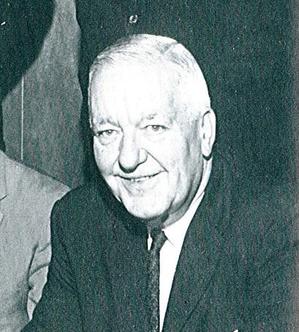
Charles Carpenter Meeker is an American politician and member of the Democratic Party who served as the 34th Mayor of Raleigh, North Carolina. He was first elected in 2001 over Republican Paul Coble, and reelected for a fifth two-year term in 2009. A fifth term tied Meeker with Avery C. Upchurch as Raleigh's longest-serving mayor.

The 53rd United States Congress was a meeting of the legislative branch of the United States federal government, consisting of the United States Senate and the United States House of Representatives. It met in Washington, D.C., from March 4, 1893, to March 4, 1895, during the first two years of Grover Cleveland's second presidency. The apportionment of seats in the House of Representatives was based on the 1890 United States census.

The 68th United States Congress was a meeting of the legislative branch of the United States federal government, consisting of the United States Senate and the United States House of Representatives. It met in Washington, D.C., from March 4, 1923, to March 4, 1925, during the last months of Warren G. Harding's presidency, and the first years of the administration of his successor, Calvin Coolidge. The apportionment of seats in the House of Representatives was based on the 1910 United States census.

The 61st United States Congress was a meeting of the legislative branch of the United States federal government, composed of the United States Senate and the United States House of Representatives. It met in Washington, D.C., from March 4, 1909, to March 4, 1911, during the first two years of William H. Taft's presidency. The apportionment of seats in the House of Representatives was based on the 1900 United States census. Both chambers had a Republican majority.

The 60th United States Congress was a meeting of the legislative branch of the United States federal government, composed of the United States Senate and the United States House of Representatives. It met in Washington, DC from March 4, 1907, to March 4, 1909, during the last two years of Theodore Roosevelt's presidency. The apportionment of seats in the House of Representatives was based on the 1900 United States census. Both chambers had a Republican majority.

The 55th United States Congress was a meeting of the legislative branch of the United States federal government, composed of the United States Senate and the United States House of Representatives. It met in Washington, D.C., from March 4, 1897, to March 4, 1899, during the first two years of William McKinley's presidency. The apportionment of seats in the House of Representatives was based on the 1890 United States census. Both chambers had a Republican majority. There was one African-American member, George Henry White, a Republican from the state of North Carolina, and one Kaw member, Charles Curtis, a Republican from Kansas.

The 50th United States Congress was a meeting of the legislative branch of the United States federal government, consisting of the United States Senate and the United States House of Representatives. It met in Washington, D.C., from March 4, 1887, to March 4, 1889, during the third and fourth years of Grover Cleveland's first presidency. The president vetoed 212 pieces of legislation, the greatest number in a single session of Congress.

The 62nd United States Congress was a meeting of the legislative branch of the United States federal government, composed of the United States Senate and the United States House of Representatives. It met in Washington, D.C., from March 4, 1911, to March 4, 1913, during the final two years of William H. Taft's presidency.

The 63rd United States Congress was a meeting of the legislative branch of the United States federal government, composed of the United States Senate and the United States House of Representatives. It met in Washington, D.C. from March 4, 1913, to March 4, 1915, during the first two years of Woodrow Wilson's presidency. The apportionment of seats in the House of Representatives was based on the 1910 United States census.

The 46th United States Congress was a meeting of the legislative branch of the United States federal government, consisting of the United States Senate and the United States House of Representatives. It met in Washington, D.C. from March 4, 1879, to March 4, 1881, during the last two years of Rutherford Hayes's presidency.

The 52nd United States Congress was a meeting of the legislative branch of the United States federal government, consisting of the United States Senate and the United States House of Representatives. It met in Washington, D.C., from March 4, 1891, to March 4, 1893, during the final two years of Benjamin Harrison's presidency.

The 58th United States Congress was a meeting of the legislative branch of the United States federal government, composed of the United States Senate and the United States House of Representatives. It met in Washington, DC, from March 4, 1903, to March 4, 1905, during the third and fourth years of Theodore Roosevelt's presidency. The apportionment of seats in the House of Representatives was based on the 1900 United States census. Both chambers had a Republican majority.

The president pro tempore of the North Carolina Senate is the highest-ranking officer of one house of the North Carolina General Assembly. The president of the Senate is the Lieutenant Governor of North Carolina, but the president pro tempore actually holds most of the power and presides in the absence of the Lt. Governor. The president pro tempore, a senior member of the party with a majority of seats, appoints senators to committees and also appoints certain members of state boards and commissions. From 1777 to 1868, North Carolina had no Lieutenant Governor, and the highest-ranking officer of the Senate was known as the "Speaker". The Speaker of the Senate was next in line if the office of Governor became vacant. This occurred on two occasions.

The North Carolina General Assembly of 2007–08 consisted of the North Carolina House of Representatives and the North Carolina Senate that met in Raleigh, North Carolina, in 2007 and 2008. Members of the House and Senate were elected on November 7, 2006. This legislature first convened in January 2007. In addition to its regular sessions, the legislature met in special session in March 2008 to consider expelling Representative Thomas E. Wright.

William Gilmore "Bill" Enloe was an American businessman and politician who served as the Mayor of Raleigh, North Carolina from 1957 to 1963. Enloe was born in South Carolina and sold popcorn before moving to North Carolina and taking up work with North Carolina Theatres, Inc. In 1953 he was elected to the City Council of Raleigh. Four years later he was elected Mayor. During his tenure the American South was permeated by civil unrest due to racial segregation. Considered a moderate on civil rights, Enloe criticized black demonstrators and resisted efforts to integrate the theaters he managed, but he eventually compromised and appointed a committee to oversee the desegregation of Raleigh businesses. He left office in 1963, but returned to the city council in 1971. He died the following year. William G. Enloe High School in Raleigh was named in his honor.

The mayor of Raleigh is the mayor of Raleigh, the state capital of North Carolina, in the United States. Raleigh operates with council-manager government, under which the mayor is elected separately from Raleigh City Council, of which they are the eighth member.

John Wesley Winters Sr. was an American real estate developer, politician, and civil rights activist. A member of the Democratic Party, he served on City Council of Raleigh, North Carolina, from 1961 until 1967 and in the North Carolina Senate for the 14th district from 1975 until 1977.

The 2024 Raleigh mayoral election was held on November 5, 2024. It will elect the mayor of Raleigh, North Carolina. Municipal elections in Raleigh are officially nonpartisan and use the plurality vote system, with no possibility of a runoff.











